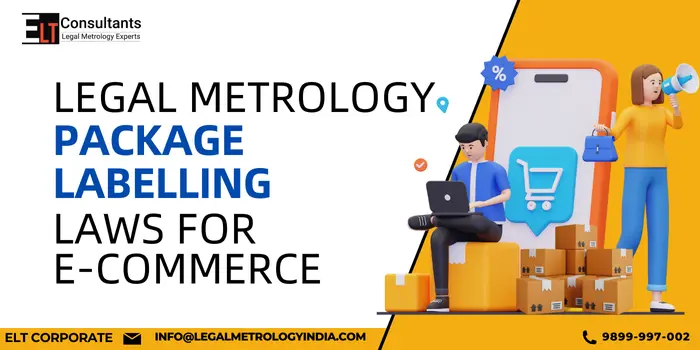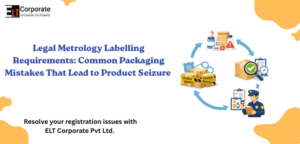Navigating the world of e-commerce can be challenging, especially when it comes to compliance with legal regulations. One critical aspect that many online sellers often overlook is labelling laws. These laws dictate how products should be able to ensure transparency and safety for consumers. This article will tell you about the laws leaning toward legal metrology package labelling laws for e-commerce, especially legal metrology. Understanding these regulations can help you avoid penalties and enhance your business reputation.
What Are Labeling Laws for E-Commerce?
Breaking laws for e-commerce refers to the regulation that governs how products must be labelled for sale online. These laws are designed to protect consumers by ensuring they receive accurate information about the products they purchase. They include details like ingredients, usage, instructions, and safety warnings. Compliance with these laws is not just a legal requirement; it also builds trust with your customers.
Why Are Labeling Laws Important in E-Commerce?
Labelling laws are crucial for several reasons. First, they help maintain transparency between sellers and consumers. When you provide accurate product information, customers can make informed decisions. Second, adhering to these laws can prevent legal issues non-compliance may result in fines or other penalties. That can hurt your business financially. Finally, proper labelling enhances your brand image and fosters customer loyalty.
Who Is Responsible for Compliance with Labeling Laws?
Both manufacturers and sellers are responsible for compliance with linking laws if you are manufacturing products, you must ensure that they are labelled correctly before they reach the e-commerce platform. However, as a seller, you also bear the responsibility of ensuring that the products you offer comply with these laws. This responsibility can sometimes create confusion, but understanding your obligation is the key to successful compliance.
When Should Businesses Update Their Product Labels?
Businesses should regularly review and update their product labels, especially when there are changes in regulations of product formulations. If you introduce a new ingredient or change your packaging, it’s essential to update the label accordingly. Additionally, keeping up with evolving laws can help you stay compliant with regular audits of your products. Leaving can prevent potential issues down the line.
Where Can You Find Information on Package Labelling Laws for E-Commerce?
Information about labelling laws for e-commerce can be found through several channels. Government websites, such as the Federal Trade Commission and the US Department of Commerce, provide resources and guidelines. Additionally, industry associations often publish relevant materials. Consulting with legal experts specialising in e-commerce can also provide clarity on specific regulations applicable to your products.
What Are the Key Components of E-Commerce Product Labels?
Setting up product labels for e-commerce must include key components. This generally, includes the product name, manufacturing details and a list of ingredients or material used. You should also include user instructions, safety warnings and expiration dates if applicable. Ensuring that these components are clear and easy to help the requirements and improve customer satisfaction.
How Do Package Labelling Laws for E-Commerce Vary by Product Type?
Product labelling laws can be differentiated significantly depending on the type of product you sell and send. For example, food products have specific requirements regarding nutrition information and allergens. On the other hand, cosmetics must include ingredient lists and usage instructions. Understanding the specific regulations that apply to your product type is important. Each category may have unique standards that you must meet.
What Are the Consequences of Non-Compliance Package Labelling Laws for E-Commerce?
Noncompliance with levelling laws can have serious consequences. This may include fines, product recalls, or even legal actions. Additionally, being found non-compliant can damage your brand’s reputation, leading to a loss of customer trust. This is why it’s essential to prioritise compliance and regularly review your leasing practices.
How Can You Ensure Compliance with Labeling Laws?
Compliance with people’s laws involves several steps. First, familiarise yourself with the relevant laws that apply to your product. Next, implement a system for regularly reviewing and updating your labels. Consulting with legal experts or compliance specialists can provide valuable insights. Training your team on labelling loss is also essential to maintain consistent compliance.
How Does Legal Metrology Impact E-Commerce Package Labeling?
Legal metrology ensures that the measurements and weights are accurate and clearly labeled on the packaging, which is crucial for e-commerce transparency. For online sales, this includes displaying the product’s net quantity, dimensions, or volume accurately, as required by law.
Conclusion
Understanding Package Labelling Laws for E-Commerce legal metrology is essential for any online seller. Compliance not only protects you from legal issues but also builds trust with your customers. By familiarizing yourself with these laws and regularly reviewing your labelling practices you can ensure that your business operates smoothly. Whether you are a new seller or a seasoned pro this knowledge is important for long-term success in the e-commerce landscape.
Frequently Asked Questions (FAQS)
What are Labelling Laws for E-Commerce?
Labelling laws dictate how the product must be labelled before they are sold online, ensuring branches and duty for consumers.
Why are Labelling Laws Important?
They maintain transparency prevent legal issues, and enhance brand image, helping businesses build customer trust.
Who is Responsible for E-Commerce Compliance?
Both manufacturers and sellers are responsible for ensuring compliance with labelling laws.
When Should I Update Product Labels?
Update labels when there are changes in regulations, product formulations, or packaging.
Where can I Find Information on Labelling Laws?
Check government websites, and industry associations, and consult legal experts for accurate information.
What Key Components must be Included on Labels?
Include the product name, manufacturer details, ingredients, usage instructions, safety warnings, and expiry dates.
How do Labelling Laws vary by Product Type?
Product categories have unique labelling requirements, such as specific ingredient lists for food and cosmetics.
What are the Consequences of Non-Compliance?
Non-compliant can lead to fines product recalls, legal actions, and damage to brand reputation.
How can I Ensure Compliance with Labelling Laws?
Familiarize yourself with the relevant laws, regularly review labels and consider consulting with compliance specialists.








